Business Law Case Study: LAW105 - Contractual Disputes and Mistakes
VerifiedAdded on 2022/10/10
|8
|1893
|50
Case Study
AI Summary
This case study analyzes a scenario involving a contract dispute between Li and the Lame Duck Restaurant. The document explores the formation of a valid contract, including offer, acceptance, and consideration. It then delves into the issue of a unilateral mistake made by the restaurant's employee regarding pricing. Finally, the case study examines the consequences of the restaurant's potential breach of contract by refusing to provide the venue for a wedding, outlining Li's options for seeking remedies, such as specific performance or damages. The analysis references relevant case law, including Taylor v Johnson, to support the conclusions regarding the legal issues presented in the case.
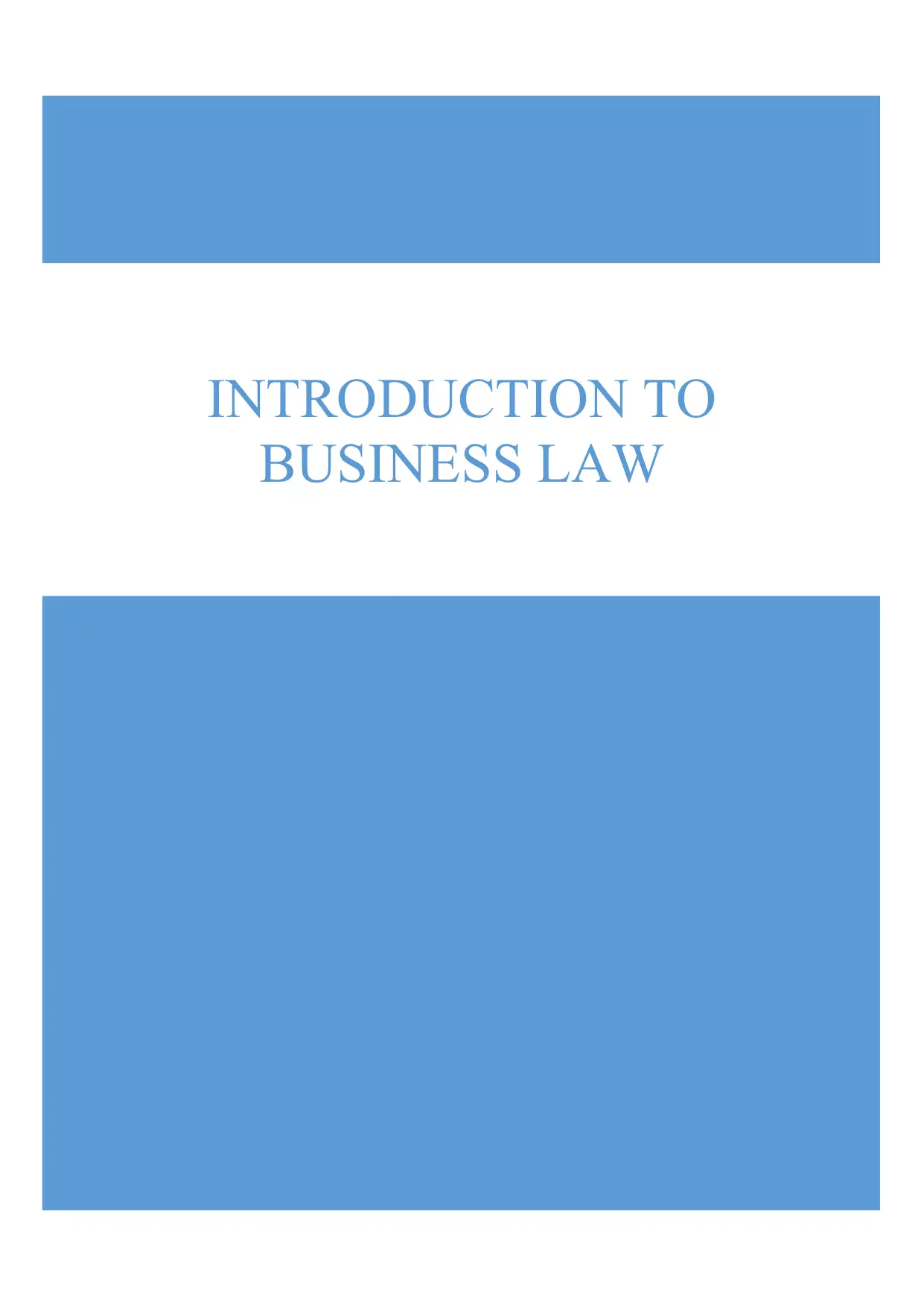
INTRODUCTION TO
BUSINESS LAW
BUSINESS LAW
Paraphrase This Document
Need a fresh take? Get an instant paraphrase of this document with our AI Paraphraser
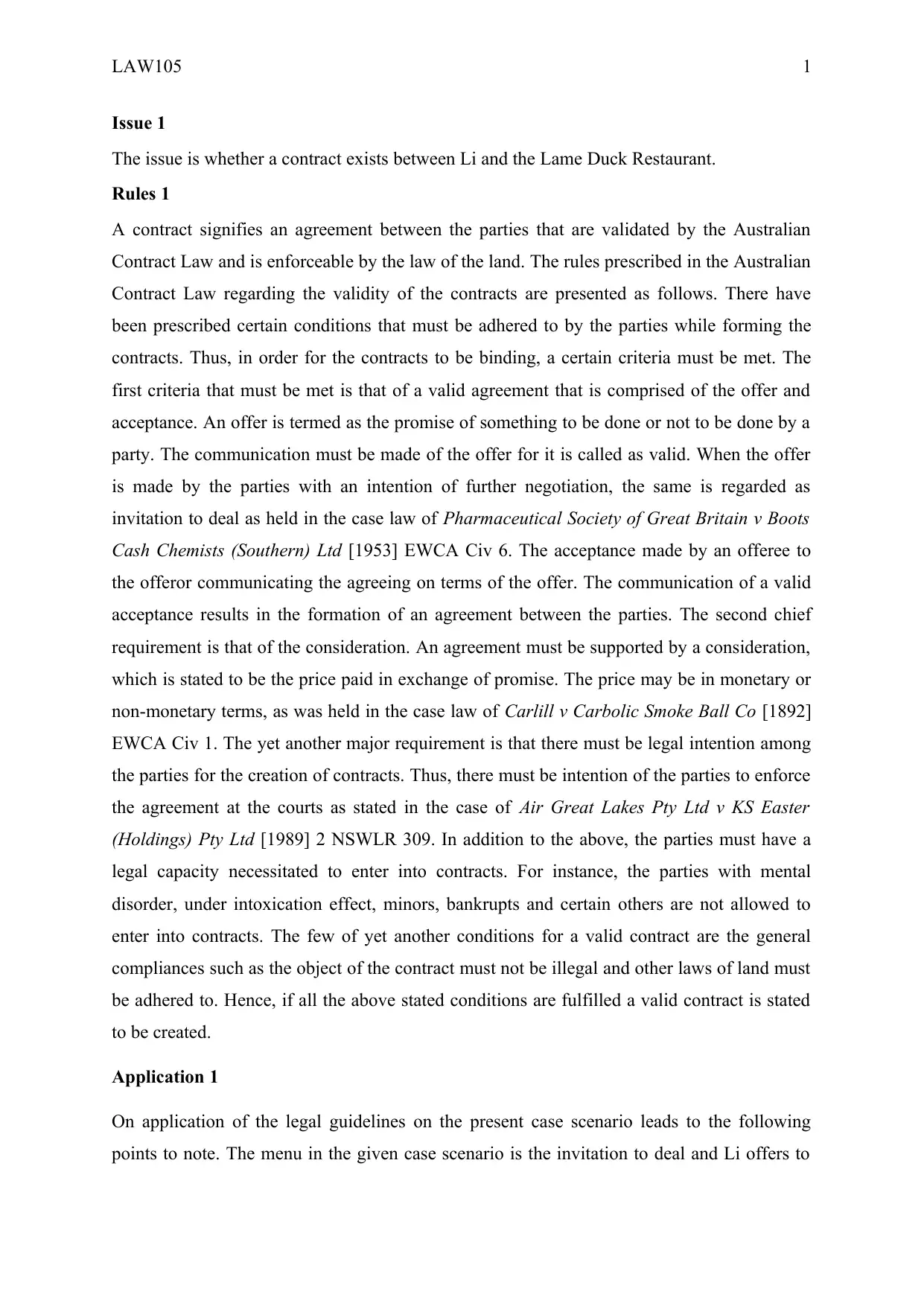
LAW105 1
Issue 1
The issue is whether a contract exists between Li and the Lame Duck Restaurant.
Rules 1
A contract signifies an agreement between the parties that are validated by the Australian
Contract Law and is enforceable by the law of the land. The rules prescribed in the Australian
Contract Law regarding the validity of the contracts are presented as follows. There have
been prescribed certain conditions that must be adhered to by the parties while forming the
contracts. Thus, in order for the contracts to be binding, a certain criteria must be met. The
first criteria that must be met is that of a valid agreement that is comprised of the offer and
acceptance. An offer is termed as the promise of something to be done or not to be done by a
party. The communication must be made of the offer for it is called as valid. When the offer
is made by the parties with an intention of further negotiation, the same is regarded as
invitation to deal as held in the case law of Pharmaceutical Society of Great Britain v Boots
Cash Chemists (Southern) Ltd [1953] EWCA Civ 6. The acceptance made by an offeree to
the offeror communicating the agreeing on terms of the offer. The communication of a valid
acceptance results in the formation of an agreement between the parties. The second chief
requirement is that of the consideration. An agreement must be supported by a consideration,
which is stated to be the price paid in exchange of promise. The price may be in monetary or
non-monetary terms, as was held in the case law of Carlill v Carbolic Smoke Ball Co [1892]
EWCA Civ 1. The yet another major requirement is that there must be legal intention among
the parties for the creation of contracts. Thus, there must be intention of the parties to enforce
the agreement at the courts as stated in the case of Air Great Lakes Pty Ltd v KS Easter
(Holdings) Pty Ltd [1989] 2 NSWLR 309. In addition to the above, the parties must have a
legal capacity necessitated to enter into contracts. For instance, the parties with mental
disorder, under intoxication effect, minors, bankrupts and certain others are not allowed to
enter into contracts. The few of yet another conditions for a valid contract are the general
compliances such as the object of the contract must not be illegal and other laws of land must
be adhered to. Hence, if all the above stated conditions are fulfilled a valid contract is stated
to be created.
Application 1
On application of the legal guidelines on the present case scenario leads to the following
points to note. The menu in the given case scenario is the invitation to deal and Li offers to
Issue 1
The issue is whether a contract exists between Li and the Lame Duck Restaurant.
Rules 1
A contract signifies an agreement between the parties that are validated by the Australian
Contract Law and is enforceable by the law of the land. The rules prescribed in the Australian
Contract Law regarding the validity of the contracts are presented as follows. There have
been prescribed certain conditions that must be adhered to by the parties while forming the
contracts. Thus, in order for the contracts to be binding, a certain criteria must be met. The
first criteria that must be met is that of a valid agreement that is comprised of the offer and
acceptance. An offer is termed as the promise of something to be done or not to be done by a
party. The communication must be made of the offer for it is called as valid. When the offer
is made by the parties with an intention of further negotiation, the same is regarded as
invitation to deal as held in the case law of Pharmaceutical Society of Great Britain v Boots
Cash Chemists (Southern) Ltd [1953] EWCA Civ 6. The acceptance made by an offeree to
the offeror communicating the agreeing on terms of the offer. The communication of a valid
acceptance results in the formation of an agreement between the parties. The second chief
requirement is that of the consideration. An agreement must be supported by a consideration,
which is stated to be the price paid in exchange of promise. The price may be in monetary or
non-monetary terms, as was held in the case law of Carlill v Carbolic Smoke Ball Co [1892]
EWCA Civ 1. The yet another major requirement is that there must be legal intention among
the parties for the creation of contracts. Thus, there must be intention of the parties to enforce
the agreement at the courts as stated in the case of Air Great Lakes Pty Ltd v KS Easter
(Holdings) Pty Ltd [1989] 2 NSWLR 309. In addition to the above, the parties must have a
legal capacity necessitated to enter into contracts. For instance, the parties with mental
disorder, under intoxication effect, minors, bankrupts and certain others are not allowed to
enter into contracts. The few of yet another conditions for a valid contract are the general
compliances such as the object of the contract must not be illegal and other laws of land must
be adhered to. Hence, if all the above stated conditions are fulfilled a valid contract is stated
to be created.
Application 1
On application of the legal guidelines on the present case scenario leads to the following
points to note. The menu in the given case scenario is the invitation to deal and Li offers to
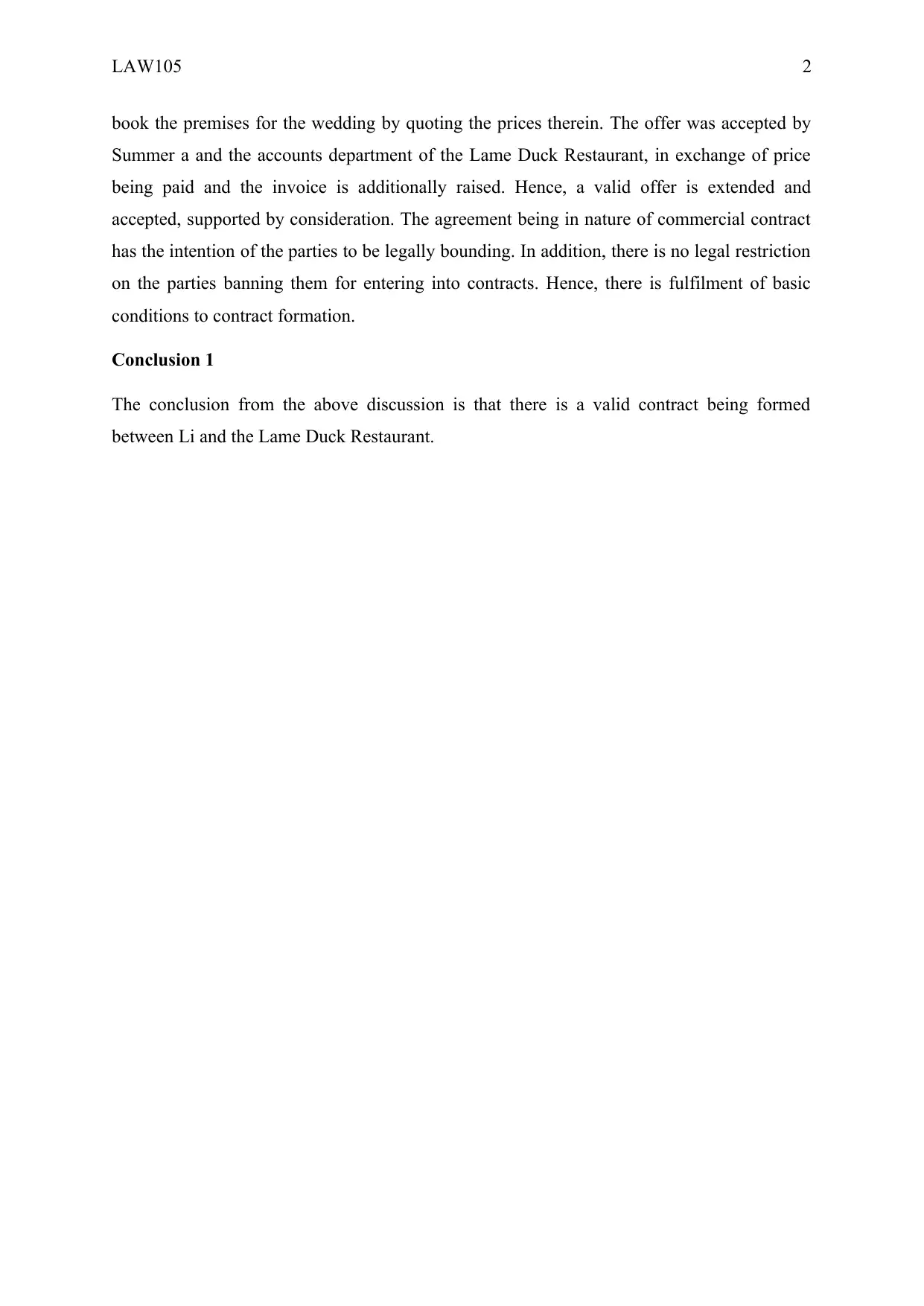
LAW105 2
book the premises for the wedding by quoting the prices therein. The offer was accepted by
Summer a and the accounts department of the Lame Duck Restaurant, in exchange of price
being paid and the invoice is additionally raised. Hence, a valid offer is extended and
accepted, supported by consideration. The agreement being in nature of commercial contract
has the intention of the parties to be legally bounding. In addition, there is no legal restriction
on the parties banning them for entering into contracts. Hence, there is fulfilment of basic
conditions to contract formation.
Conclusion 1
The conclusion from the above discussion is that there is a valid contract being formed
between Li and the Lame Duck Restaurant.
book the premises for the wedding by quoting the prices therein. The offer was accepted by
Summer a and the accounts department of the Lame Duck Restaurant, in exchange of price
being paid and the invoice is additionally raised. Hence, a valid offer is extended and
accepted, supported by consideration. The agreement being in nature of commercial contract
has the intention of the parties to be legally bounding. In addition, there is no legal restriction
on the parties banning them for entering into contracts. Hence, there is fulfilment of basic
conditions to contract formation.
Conclusion 1
The conclusion from the above discussion is that there is a valid contract being formed
between Li and the Lame Duck Restaurant.
⊘ This is a preview!⊘
Do you want full access?
Subscribe today to unlock all pages.

Trusted by 1+ million students worldwide
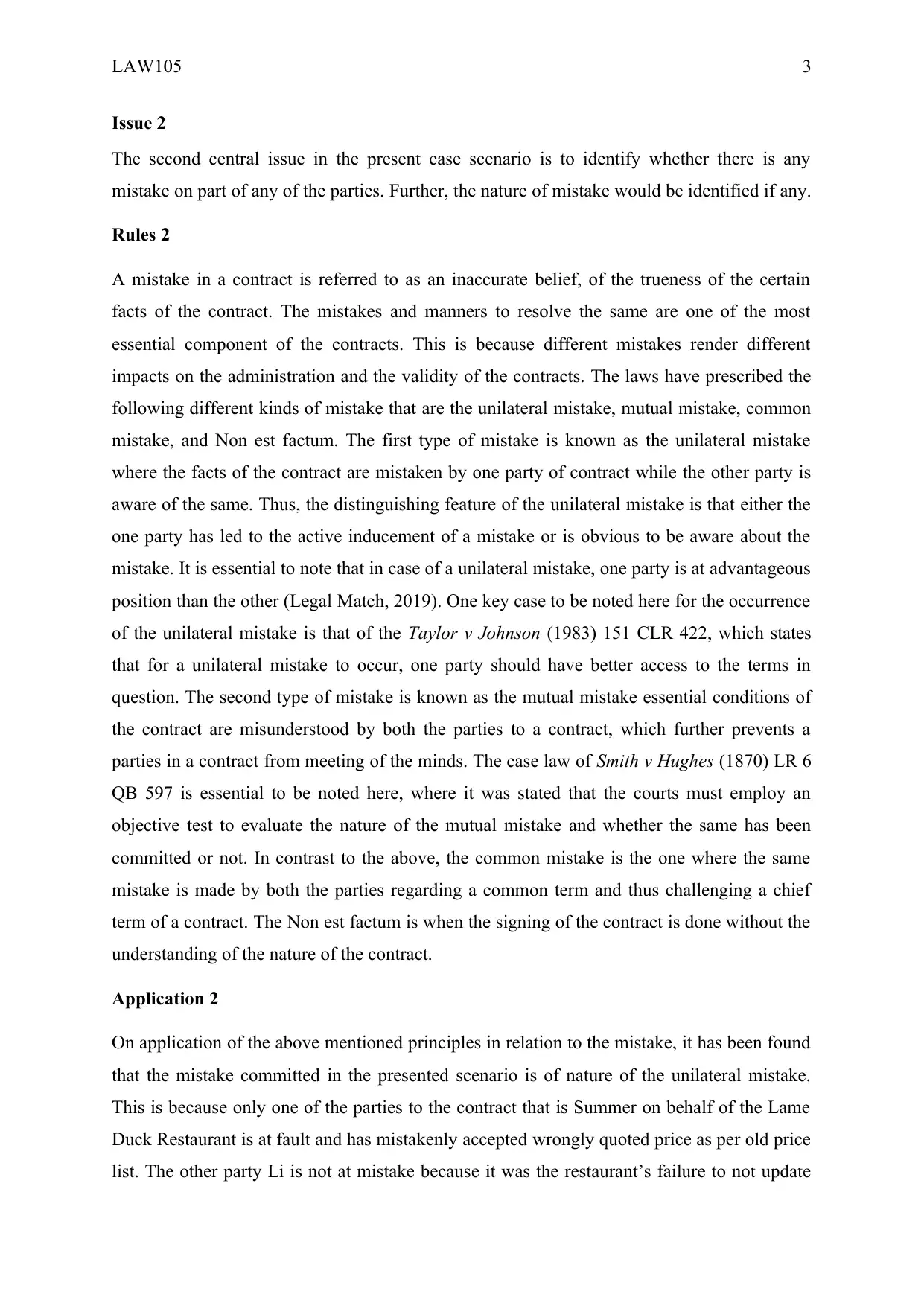
LAW105 3
Issue 2
The second central issue in the present case scenario is to identify whether there is any
mistake on part of any of the parties. Further, the nature of mistake would be identified if any.
Rules 2
A mistake in a contract is referred to as an inaccurate belief, of the trueness of the certain
facts of the contract. The mistakes and manners to resolve the same are one of the most
essential component of the contracts. This is because different mistakes render different
impacts on the administration and the validity of the contracts. The laws have prescribed the
following different kinds of mistake that are the unilateral mistake, mutual mistake, common
mistake, and Non est factum. The first type of mistake is known as the unilateral mistake
where the facts of the contract are mistaken by one party of contract while the other party is
aware of the same. Thus, the distinguishing feature of the unilateral mistake is that either the
one party has led to the active inducement of a mistake or is obvious to be aware about the
mistake. It is essential to note that in case of a unilateral mistake, one party is at advantageous
position than the other (Legal Match, 2019). One key case to be noted here for the occurrence
of the unilateral mistake is that of the Taylor v Johnson (1983) 151 CLR 422, which states
that for a unilateral mistake to occur, one party should have better access to the terms in
question. The second type of mistake is known as the mutual mistake essential conditions of
the contract are misunderstood by both the parties to a contract, which further prevents a
parties in a contract from meeting of the minds. The case law of Smith v Hughes (1870) LR 6
QB 597 is essential to be noted here, where it was stated that the courts must employ an
objective test to evaluate the nature of the mutual mistake and whether the same has been
committed or not. In contrast to the above, the common mistake is the one where the same
mistake is made by both the parties regarding a common term and thus challenging a chief
term of a contract. The Non est factum is when the signing of the contract is done without the
understanding of the nature of the contract.
Application 2
On application of the above mentioned principles in relation to the mistake, it has been found
that the mistake committed in the presented scenario is of nature of the unilateral mistake.
This is because only one of the parties to the contract that is Summer on behalf of the Lame
Duck Restaurant is at fault and has mistakenly accepted wrongly quoted price as per old price
list. The other party Li is not at mistake because it was the restaurant’s failure to not update
Issue 2
The second central issue in the present case scenario is to identify whether there is any
mistake on part of any of the parties. Further, the nature of mistake would be identified if any.
Rules 2
A mistake in a contract is referred to as an inaccurate belief, of the trueness of the certain
facts of the contract. The mistakes and manners to resolve the same are one of the most
essential component of the contracts. This is because different mistakes render different
impacts on the administration and the validity of the contracts. The laws have prescribed the
following different kinds of mistake that are the unilateral mistake, mutual mistake, common
mistake, and Non est factum. The first type of mistake is known as the unilateral mistake
where the facts of the contract are mistaken by one party of contract while the other party is
aware of the same. Thus, the distinguishing feature of the unilateral mistake is that either the
one party has led to the active inducement of a mistake or is obvious to be aware about the
mistake. It is essential to note that in case of a unilateral mistake, one party is at advantageous
position than the other (Legal Match, 2019). One key case to be noted here for the occurrence
of the unilateral mistake is that of the Taylor v Johnson (1983) 151 CLR 422, which states
that for a unilateral mistake to occur, one party should have better access to the terms in
question. The second type of mistake is known as the mutual mistake essential conditions of
the contract are misunderstood by both the parties to a contract, which further prevents a
parties in a contract from meeting of the minds. The case law of Smith v Hughes (1870) LR 6
QB 597 is essential to be noted here, where it was stated that the courts must employ an
objective test to evaluate the nature of the mutual mistake and whether the same has been
committed or not. In contrast to the above, the common mistake is the one where the same
mistake is made by both the parties regarding a common term and thus challenging a chief
term of a contract. The Non est factum is when the signing of the contract is done without the
understanding of the nature of the contract.
Application 2
On application of the above mentioned principles in relation to the mistake, it has been found
that the mistake committed in the presented scenario is of nature of the unilateral mistake.
This is because only one of the parties to the contract that is Summer on behalf of the Lame
Duck Restaurant is at fault and has mistakenly accepted wrongly quoted price as per old price
list. The other party Li is not at mistake because it was the restaurant’s failure to not update
Paraphrase This Document
Need a fresh take? Get an instant paraphrase of this document with our AI Paraphraser
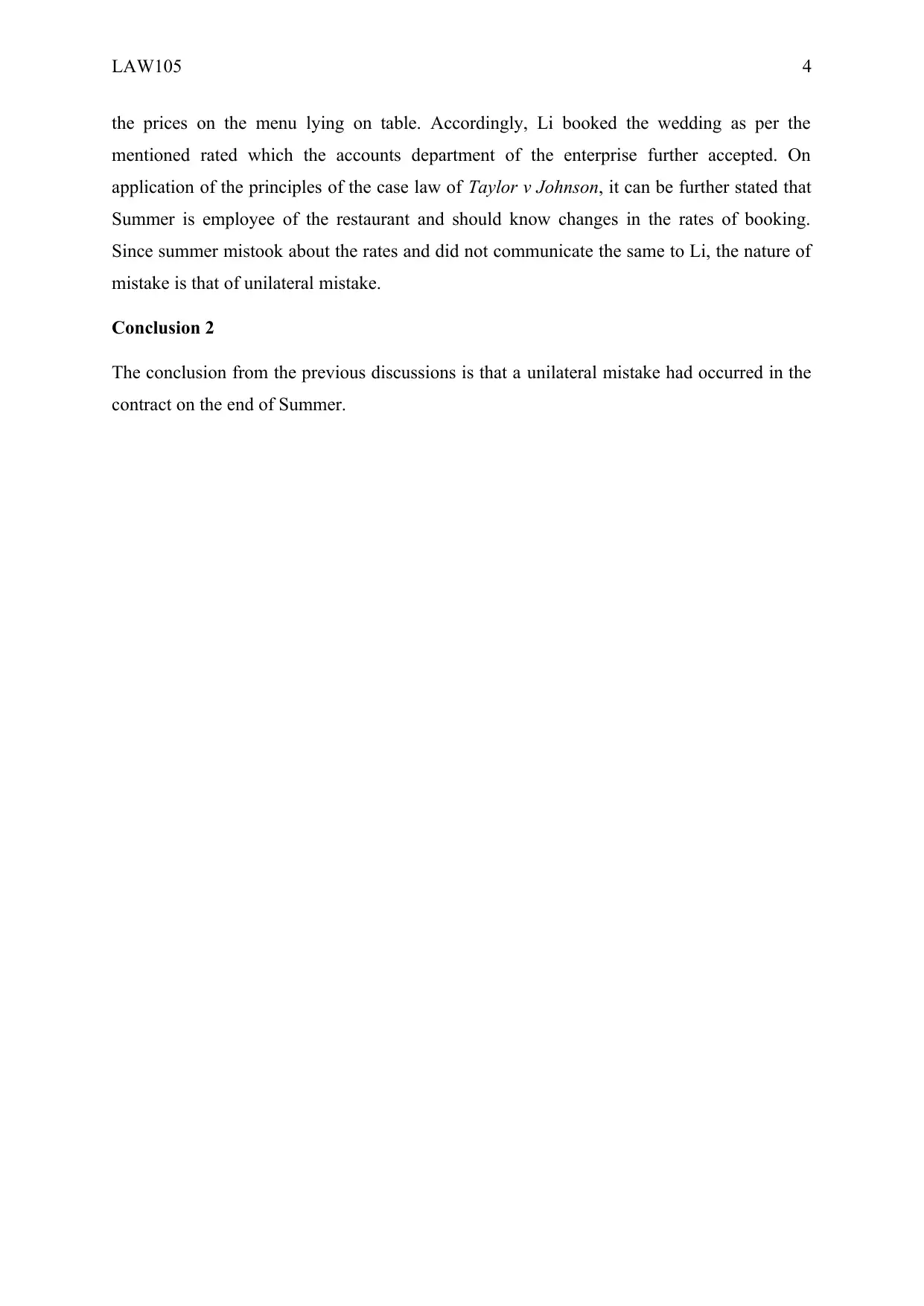
LAW105 4
the prices on the menu lying on table. Accordingly, Li booked the wedding as per the
mentioned rated which the accounts department of the enterprise further accepted. On
application of the principles of the case law of Taylor v Johnson, it can be further stated that
Summer is employee of the restaurant and should know changes in the rates of booking.
Since summer mistook about the rates and did not communicate the same to Li, the nature of
mistake is that of unilateral mistake.
Conclusion 2
The conclusion from the previous discussions is that a unilateral mistake had occurred in the
contract on the end of Summer.
the prices on the menu lying on table. Accordingly, Li booked the wedding as per the
mentioned rated which the accounts department of the enterprise further accepted. On
application of the principles of the case law of Taylor v Johnson, it can be further stated that
Summer is employee of the restaurant and should know changes in the rates of booking.
Since summer mistook about the rates and did not communicate the same to Li, the nature of
mistake is that of unilateral mistake.
Conclusion 2
The conclusion from the previous discussions is that a unilateral mistake had occurred in the
contract on the end of Summer.
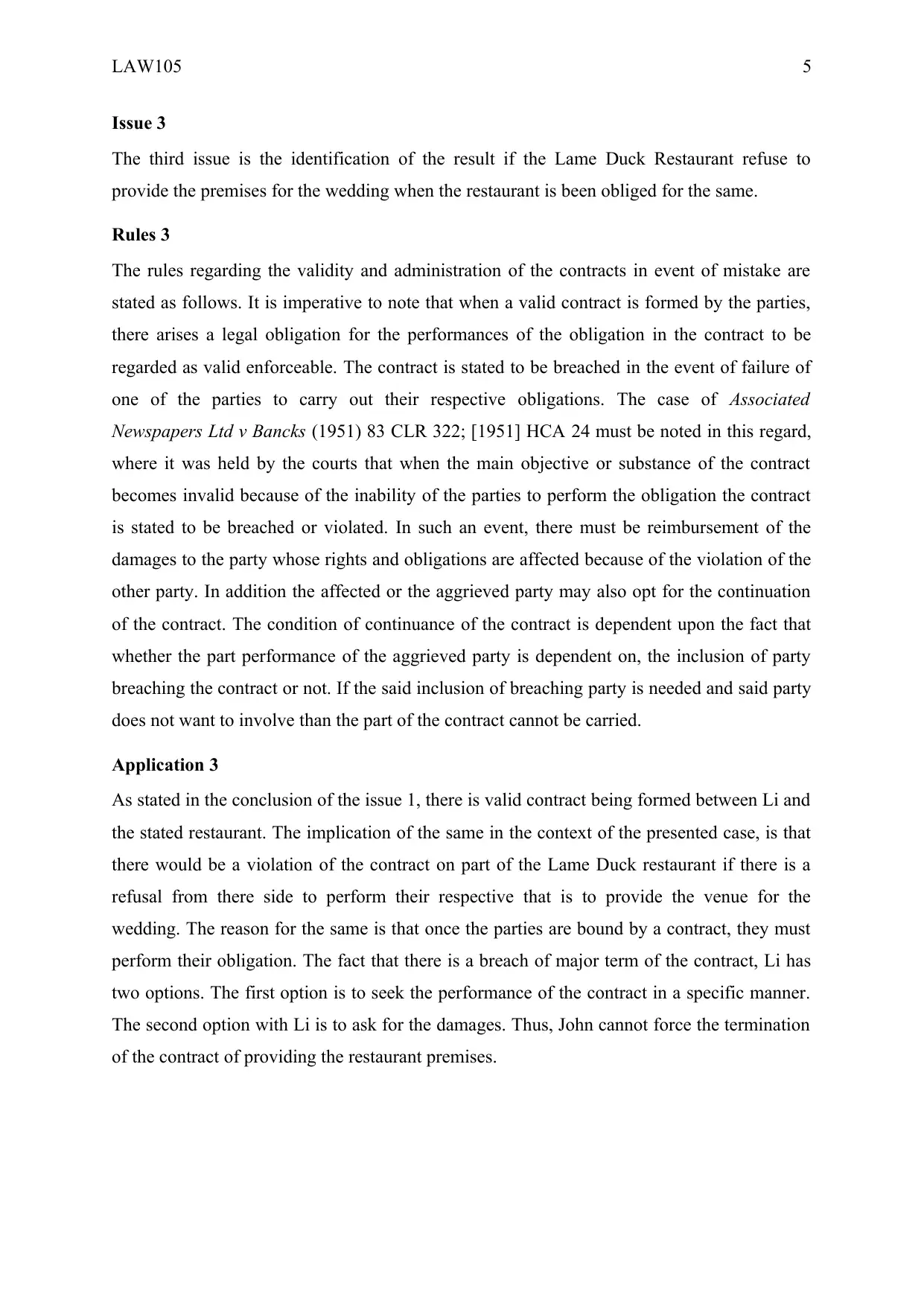
LAW105 5
Issue 3
The third issue is the identification of the result if the Lame Duck Restaurant refuse to
provide the premises for the wedding when the restaurant is been obliged for the same.
Rules 3
The rules regarding the validity and administration of the contracts in event of mistake are
stated as follows. It is imperative to note that when a valid contract is formed by the parties,
there arises a legal obligation for the performances of the obligation in the contract to be
regarded as valid enforceable. The contract is stated to be breached in the event of failure of
one of the parties to carry out their respective obligations. The case of Associated
Newspapers Ltd v Bancks (1951) 83 CLR 322; [1951] HCA 24 must be noted in this regard,
where it was held by the courts that when the main objective or substance of the contract
becomes invalid because of the inability of the parties to perform the obligation the contract
is stated to be breached or violated. In such an event, there must be reimbursement of the
damages to the party whose rights and obligations are affected because of the violation of the
other party. In addition the affected or the aggrieved party may also opt for the continuation
of the contract. The condition of continuance of the contract is dependent upon the fact that
whether the part performance of the aggrieved party is dependent on, the inclusion of party
breaching the contract or not. If the said inclusion of breaching party is needed and said party
does not want to involve than the part of the contract cannot be carried.
Application 3
As stated in the conclusion of the issue 1, there is valid contract being formed between Li and
the stated restaurant. The implication of the same in the context of the presented case, is that
there would be a violation of the contract on part of the Lame Duck restaurant if there is a
refusal from there side to perform their respective that is to provide the venue for the
wedding. The reason for the same is that once the parties are bound by a contract, they must
perform their obligation. The fact that there is a breach of major term of the contract, Li has
two options. The first option is to seek the performance of the contract in a specific manner.
The second option with Li is to ask for the damages. Thus, John cannot force the termination
of the contract of providing the restaurant premises.
Issue 3
The third issue is the identification of the result if the Lame Duck Restaurant refuse to
provide the premises for the wedding when the restaurant is been obliged for the same.
Rules 3
The rules regarding the validity and administration of the contracts in event of mistake are
stated as follows. It is imperative to note that when a valid contract is formed by the parties,
there arises a legal obligation for the performances of the obligation in the contract to be
regarded as valid enforceable. The contract is stated to be breached in the event of failure of
one of the parties to carry out their respective obligations. The case of Associated
Newspapers Ltd v Bancks (1951) 83 CLR 322; [1951] HCA 24 must be noted in this regard,
where it was held by the courts that when the main objective or substance of the contract
becomes invalid because of the inability of the parties to perform the obligation the contract
is stated to be breached or violated. In such an event, there must be reimbursement of the
damages to the party whose rights and obligations are affected because of the violation of the
other party. In addition the affected or the aggrieved party may also opt for the continuation
of the contract. The condition of continuance of the contract is dependent upon the fact that
whether the part performance of the aggrieved party is dependent on, the inclusion of party
breaching the contract or not. If the said inclusion of breaching party is needed and said party
does not want to involve than the part of the contract cannot be carried.
Application 3
As stated in the conclusion of the issue 1, there is valid contract being formed between Li and
the stated restaurant. The implication of the same in the context of the presented case, is that
there would be a violation of the contract on part of the Lame Duck restaurant if there is a
refusal from there side to perform their respective that is to provide the venue for the
wedding. The reason for the same is that once the parties are bound by a contract, they must
perform their obligation. The fact that there is a breach of major term of the contract, Li has
two options. The first option is to seek the performance of the contract in a specific manner.
The second option with Li is to ask for the damages. Thus, John cannot force the termination
of the contract of providing the restaurant premises.
⊘ This is a preview!⊘
Do you want full access?
Subscribe today to unlock all pages.

Trusted by 1+ million students worldwide
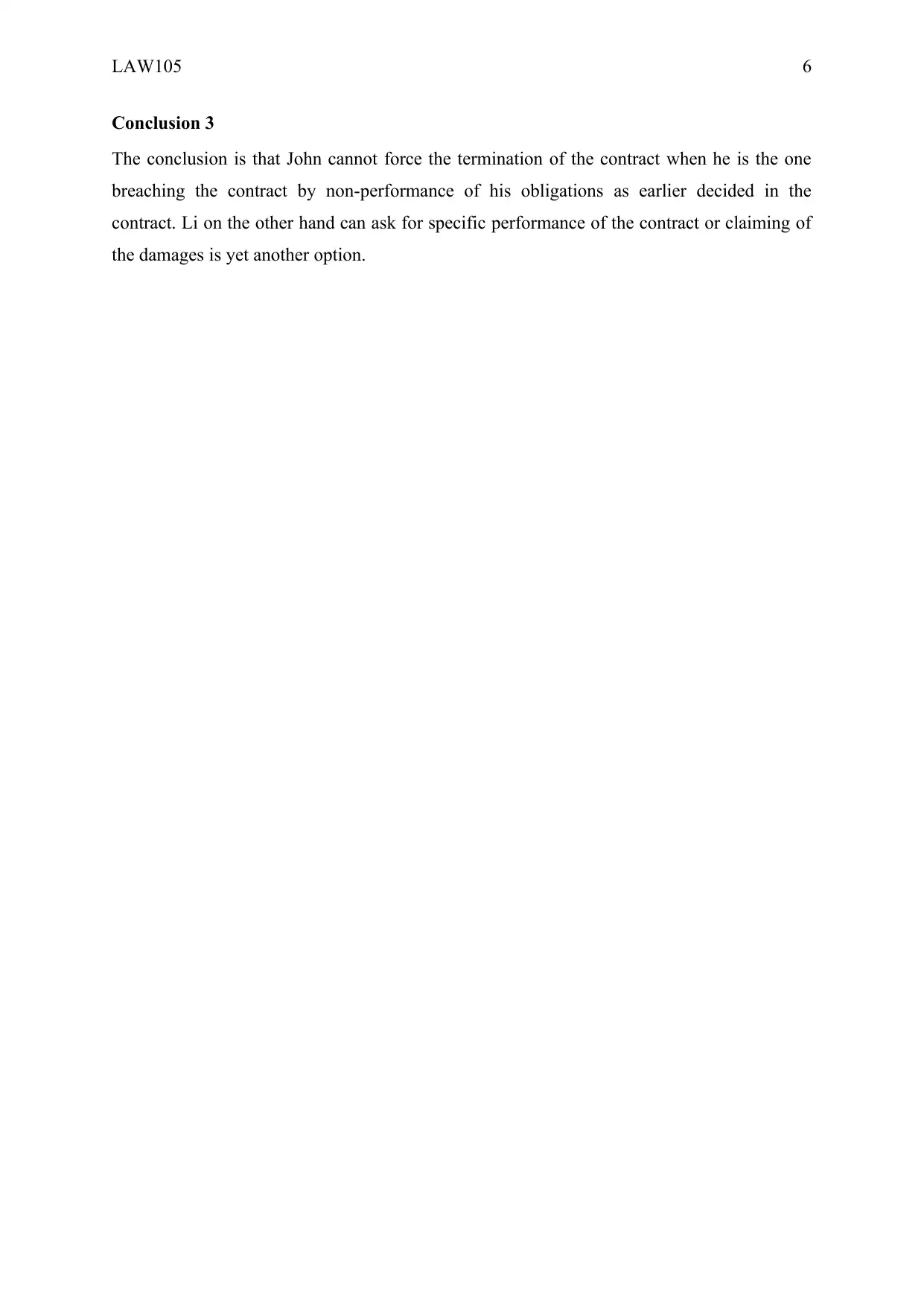
LAW105 6
Conclusion 3
The conclusion is that John cannot force the termination of the contract when he is the one
breaching the contract by non-performance of his obligations as earlier decided in the
contract. Li on the other hand can ask for specific performance of the contract or claiming of
the damages is yet another option.
Conclusion 3
The conclusion is that John cannot force the termination of the contract when he is the one
breaching the contract by non-performance of his obligations as earlier decided in the
contract. Li on the other hand can ask for specific performance of the contract or claiming of
the damages is yet another option.
Paraphrase This Document
Need a fresh take? Get an instant paraphrase of this document with our AI Paraphraser
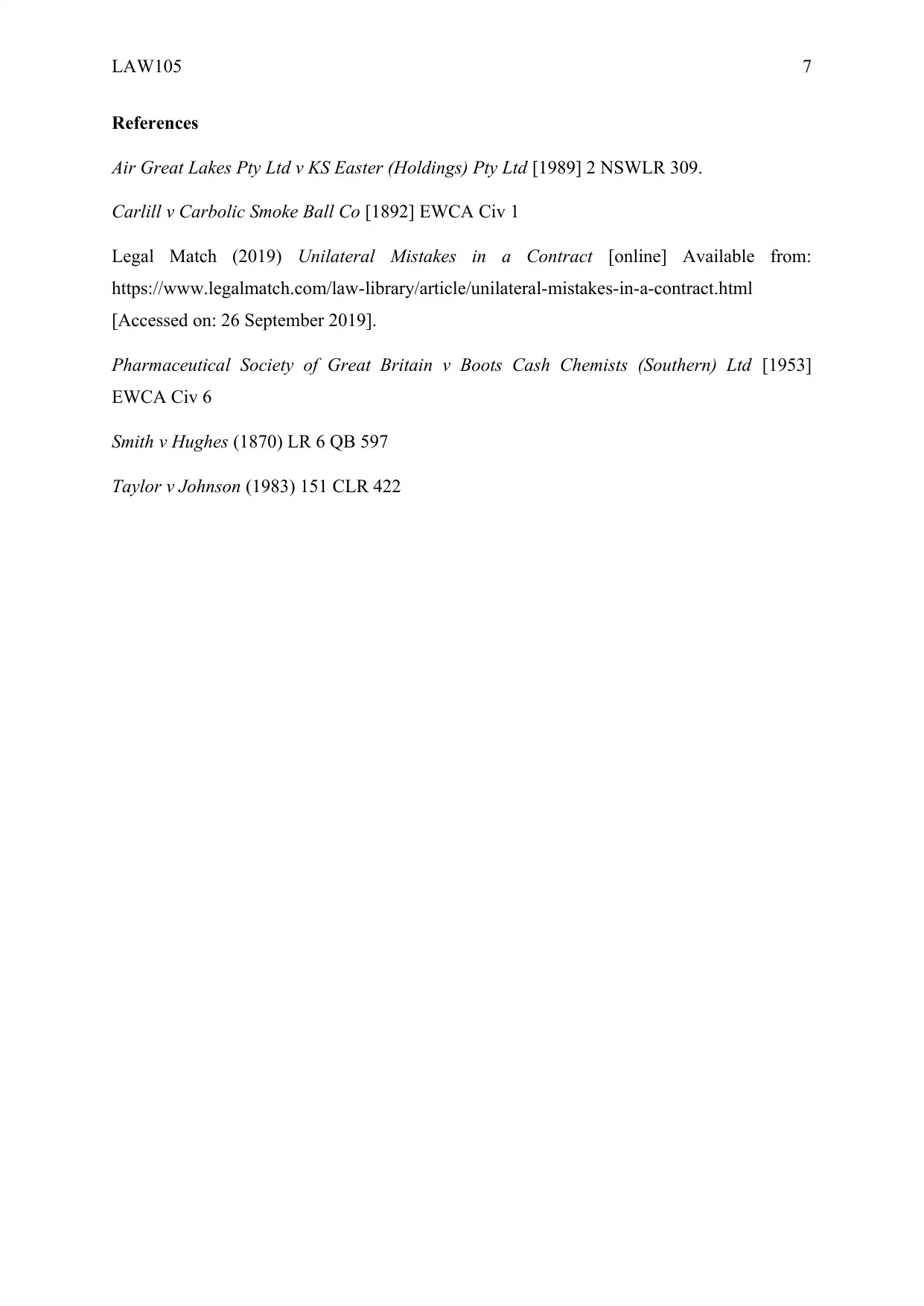
LAW105 7
References
Air Great Lakes Pty Ltd v KS Easter (Holdings) Pty Ltd [1989] 2 NSWLR 309.
Carlill v Carbolic Smoke Ball Co [1892] EWCA Civ 1
Legal Match (2019) Unilateral Mistakes in a Contract [online] Available from:
https://www.legalmatch.com/law-library/article/unilateral-mistakes-in-a-contract.html
[Accessed on: 26 September 2019].
Pharmaceutical Society of Great Britain v Boots Cash Chemists (Southern) Ltd [1953]
EWCA Civ 6
Smith v Hughes (1870) LR 6 QB 597
Taylor v Johnson (1983) 151 CLR 422
References
Air Great Lakes Pty Ltd v KS Easter (Holdings) Pty Ltd [1989] 2 NSWLR 309.
Carlill v Carbolic Smoke Ball Co [1892] EWCA Civ 1
Legal Match (2019) Unilateral Mistakes in a Contract [online] Available from:
https://www.legalmatch.com/law-library/article/unilateral-mistakes-in-a-contract.html
[Accessed on: 26 September 2019].
Pharmaceutical Society of Great Britain v Boots Cash Chemists (Southern) Ltd [1953]
EWCA Civ 6
Smith v Hughes (1870) LR 6 QB 597
Taylor v Johnson (1983) 151 CLR 422
1 out of 8
Related Documents
Your All-in-One AI-Powered Toolkit for Academic Success.
+13062052269
info@desklib.com
Available 24*7 on WhatsApp / Email
![[object Object]](/_next/static/media/star-bottom.7253800d.svg)
Unlock your academic potential
Copyright © 2020–2026 A2Z Services. All Rights Reserved. Developed and managed by ZUCOL.




